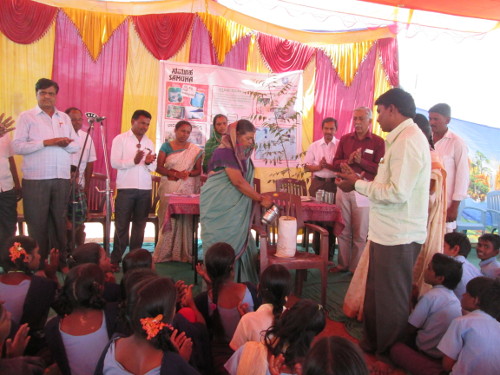Non Pesticide Management
Samuha began Non Pesticide Management (NPM) programme in 2008 with the objective of reducing cost of cultivation, less usage of chemicals and increased yield and better marketing services.
SAMUHA is a founder-member of a national network that promotes NPM (non-Pesticide Management) cropping. It focuses on NPM Paddy. Its integrated crop management system built around its NPM practices has helped farmers to save over Rs 4000 per acre from their cost of cultivation, and another Rs 3000 per acre from farm gate procurement.
A shift from the present HEIDA {(High External Inputs Destructive Agriculture) paddy cultivation practices that introduce unacceptable levels of chemicals and systemic synthetics into the food chain} to NPM (non-pesticide management) paddy cultivation practices can allow farmers to feed themselves and consumers without poisoning either themselves or their own environment, and become the single largest factor that can result in reduced water usage in Indian agriculture.
Non Pesticide Management in Paddy Cultivation
· Agriculture Extension service with Non Pesticide Management (NPM) principles was initiated with 18 farmers on Paddy in Deodurg taluk of Raichur district in 2008-09 .
Currently working with 491 farmers in 1340 acrse at Deodurg and with 41 farmers in 51 acres at Karatagi .
· Due to the systematic extension service received from the programme farmers have saved Rs.4395 per acre
· SAMUHA facilitated paddy procurement services through it’s sister organization JSMBT and farmers have saved about Rs.2600/acre.
· NPM farmers of Karatagi have got an additional net gain of Rs 11,659/- over the Conventional paddy in Kharif 2015.
· Samuha will be initiating Diversified Cropping (DCS) Approach in all 30 Project villages at Karatagi region at the rate 1 to 2 acre per village.DCS is a system with a combination of Cereals and Pulses, as an alternative to the exiting monocropping of paddy which helps to optimize the usage of major agriculture resources such as Soil, Water and Nutrients for sustainable livelihoods and environmental protection of TLBC region.
· An estimate of the increase net income through DCS approach in this TLBC command area would give farmers about 30% of increased net income.



